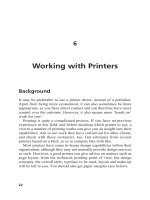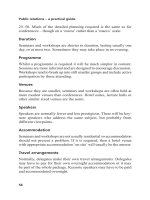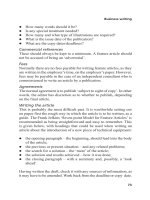Difficult People A Practical Guide to Dealing With the 10 Main Types ppt
Bạn đang xem bản rút gọn của tài liệu. Xem và tải ngay bản đầy đủ của tài liệu tại đây (3.03 MB, 18 trang )
Copyright © 2013 by Kimberly Mathews.
All rights reserved worldwide. No part of this publication may be replicated, redistributed, or given away in any
form (That's bad karma) without the prior written consent of the author/publisher.
Disclaimer
This eBook is for informational purposes only and is not intended to be a substitute for any professional advice
provided by your physician, therapist, psychiatrist or any other related professions.
Authors Note
The idea behind this eBook, is to provide you with clear, easy to use techniques and strategies, that you can
implement straight away. My goal, was not to make it complicated or over analyze everything, but to keep it simple
and to the point.
2
Table of Contents
Introduction
10 Difficult Types Of People Explained
The Intimidator
The Stealth Bomber
The Oscar Goes To Person
The Bombastic Blowhard
The Politician
The Yes People
The Fake It Till You Make It Person
The Silent Sleeper
The It Will Never Work Person
The Complainer
What Makes Some People Difficult?
Mastering Communication
Be A Great Listener
Developing Your Inner Power
The Art To Influencing Difficult People
How To Handle These Difficult People
The Intimidator
The Stealth Bomber
The Oscar Goes To Person
The Bombastic Blowhard
The Politician
The Yes People
The Fake It Till You Make It Person
The Silent Sleeper
The It Will Never Work Person
The Complainer
Conclusion
3
Introduction
It would be fair to say that we've all encountered at least one difficult person during the course of our daily job
in our social lives or even at home.
It's frustrating enough when these are people that we deal with casually, but even worse when they are
members of our family or twice as worse if it's our boss.
Unfortunately, these people can make our lives a little more difficult, put us a little more on edge and make us a
little less tolerant. If they are people we can't get away from, then it requires a little skill to deal with them and come
out unscathed.
Here are a few types that may be familiar to you?
The Intimidator
The Complainer
The Stealth Bomber
The Politician
The Bombastic Blowhard
The Fake It Till You Make It Person
These types of people can come from all walks of life, as neighbors, co-workers, and friends. They can
intimidate and belittle you you would prefer not working with them or even talking to them. But, if you can
begin to understand them and implement some basic strategies, you stand a good chance of getting what you want
done.
No longer do you have to feel like you're being attacked, cornered or manipulated while your frustration builds
up. A tactic you might have used in the past, is to walk away. Sometimes, that really is the only thing you can do
when you try to be reasonable and nothing gets through to the difficult person.
But, a lot of times there are tactics you can use that will work well. This eBook will discuss the difficult
personality types mentioned above, as well as several others. It will give you explanations for their behavior so that
you can understand why they act the way they do. You will be able to see them in a different light.
Armed with this understanding and some strategies, you'll be in a much better position to take charge in these
situations and become the master of your emotions once and for all.
4
10 Difficult Types Of People Explained
Blowhards, loud-mouths, whiners, and pessimists - they can be hard to work with and almost impossible to live
with. Here are ten of the most common difficult types of people.
Remember when reading through this list that people tend to revert to these types of behavior when they are
feeling threatened, frustrated or angry. In fact, all of us at some stage in our lives have resorted to at least one of
these behaviors.
The Intimidator
This is the type of person who sets out to destroy your perfect day and any work in progress. Even if that
person has contributed to the job at hand themselves, they burst forward, guns blazing armed with stinging criticism
and harsh accusations.
The Intimidator has only negative things to say, especially towards you and your actions, and they believe they
are the ultimate solution.
When he senses the paralyzing effect his accusations have had on everyone, he seizes his chance to take charge
and begins barking orders. However, he quickly loses interest and moves on, leaving you to clean up the mess.
The Stealth Bomber
If you're familiar with the corporate world, you have more than likely run into this type of person. After working
diligently on a project for weeks or even months, you're finally ready to present your project to the group.
Suddenly, like a true Stealth Bomber he glides in out of nowhere and proceeds to rip your presentation apart.
This person is a master at destroying your credibility with a single sarcastic remark or an evil little snicker. He
seems harmless, but he's trouble in disguise.
The Oscar Goes To Person
This type of person loves to make mountains out of mole hills, he's disruptive and quite often hostile, and
simply put, he likes to cause a scene. This is a person who throws a tantrum when they get his order wrong at
MacDonalds.
The Bombastic Blowhard
This is the person who always has the answer to a problem, without knowing what the problem is. He seeks
advice when he's stumped, BUT never agrees when it's given. He hates being corrected and when things do go
wrong, he knows who to blame You
The Politician
We all know someone like this. He's the person who won't give you a straight answer, no matter how serious
the situation. It's a pain trying to meet project deadlines with him, and you wouldn't even have a yard sale with him,
because he won't make a definite decision on anything.
The Yes People
5
These are some of the nicest people around (OK what's wrong with being nice I hear you say) But these
people can be so infuriating. They always offer to do favors for other people and want to make sure that everyone's
happy In fact, they'll do almost anything to avoid confrontations and uncomfortable situations.
However, when it comes to delivering on the things they said they would, all the excuses from under the sun
magically appear. They bite off more than they can chew when promising results and get deeply offended when you
resent them for it.
The Fake It Till You Make It Person
These are the type of people that enjoy taking charge at meetings and parties. They always think that they are
the expert on any topic and their self-confidence is so overwhelming that it takes a real expert to understand that
they're actually fakes.
The main goal of this person, is to get attention and they usually succeed by fooling everyone around them.
The Silent Sleeper
Everyone likes the strong silent type, but this type of person represents that in a bad way.
They have no opinion about anything. You won't hear them contribute to any group discussions or even attempt
to make a suggestion. Their silence always leaves you wondering, what sort of person they really are.
The It Will Never Work Person
This type of person approaches life from a position of complete pessimism.
They manage (With ease) to find faults with every good idea that's presented and sincerely believe, that no
matter how good the idea is, it will never work. They just don't understand why everyone else can't see it either.
The Complainer
We all know the complainers in our lives. These are the types of people who like to complain about everything.
They constantly feel overwhelmed and everyone is out to get them. They have such high expectations, that
reality never measures up to what they have in mind.
6
What Makes Some People Difficult?
Improving relationships with difficult people is possible, only if we understand where they're coming from. What
they're thinking will determine their behavior.
As their thoughts change, so also does their behavior. Assessing and comprehending their frame of mind is the
starting point to improving relationships with such people.
In their book "Dealing With People You Can't Stand" Dr Rick Kirschner and Dr Rick Brinkman write about
intent being the root of behavior. They state that there are four types of intent: getting it done, getting it right, getting
along, and getting appreciation.
Difficult people can quickly move from one type of intent to another, depending on their desires at that
particular point in time.
You can usually tell where a person is coming from by the way they communicate. People who are in the ' get it
done' frame of mind are fully focused on getting the job done and their communication style is concise and to the
point.
People tuned in to the 'get it right' mode, concentrate on the nitty gritty stuff, documenting the process as a
confirmation that the job has been performed successfully.
Those who are in the 'get along' mode, focus on their dealings with others as well as their emotions and
opinions. The 'get appreciated' intent induces a person to adopt a very elaborate style, with the sole aim of drawing
attention to themselves.
People having the same communication style can get on with each other and work together towards common
goals. However, when people with different intent and communication styles have to work together, several issues
can crop up.
In a scenario where people are trying hard to 'get it done' but are not able to achieve the desired results, they
tend to become more controlling. (The Intimidator), (The Stealth Bomber), and (The Bombastic Blowhard) all
become more controlling when they are faced with adversity.
The people who are trying to 'get it right' and instead find that things are going wrong, tend to focus more on
being perfectionists. (The Silent Sleeper), (The It Will Never Work Person), and (The Complainer) all begin to
pursue perfection when things are erroneously done.
People wanting to 'get along' but feel they are being sidelined, become approval seekers. (The Politician and
The Yes People) will make even greater efforts to seek approval, when they feel they're being ignored or rejected.
People with a need 'to be appreciated' who nurture feelings of being inadequately recognized, seek more
attention. (The Oscar Goes To and The Fake It Till You Make It Person) try their hardest to seek attention
whenever they feel unappreciated.
7
Mastering Communication
When people feel, they are on the same page, there is less conflict and greater cooperation. A technique known
as blending, is one where you mirror what the other person is doing as you are speaking to them; when we like
and trust an individual, this is something we do without realizing it. When dealing with someone difficult, we may do
this to make them feel more comfortable.
Blending rarely takes place in the workplace; people want to know, that you are listening to them and understand
what they are communicating. Nodding and making a noise as if to show you understand what the other person is
saying, then repeating it back to them, is a simple way to show others you are listening to them.
When we do this, the other person knows you are listening. You then want to repeat back actual words they have
used; doing this is a strong indication that you were listening to them.
The third step is to get clarification of what is being said, and this can be done by asking questions. This will give
you more specifics, and will get the difficult person you are dealing with to act rationally. Questions, demonstrate
you are taking the person seriously, and the right questions will lead to quicker solutions.
Summarizing is the fourth step; by repeating the discussion, you show you are on the same page and clarification
can also occur, by filling in the blanks with missing information. Cooperation is increased, since you show the
difficult person that you are paying attention, and making a serious effort to understand them.
The final step is to ask "do you feel understood?" This confirmation is so deliberate, that it shows you are focused
on the issue, and the difficult person is more likely to cooperate with you, thus resolving any issues.
8
Be A Great Listener
We all want to be thought of as intelligent and clever; we all know a few people who think the way this happens
is by cracking jokes, and being a smart aleck. In fact, the opposite is true, and instead you should listen to others,
and what they have to say, which will result in their belief of your intellect and wit. If you listen to them, you must be
smart!
When you listen, you have the power, namely when dealing with difficult people. Everyone wants you to know
what position they hold on any given topic. Listening allows us to learn what their needs are, but when you are
dealing with difficult people, they will put you in an uncomfortable situation, and as a result, you may tune them out.
By listening, you can learn about what others want; even early on, during the days of Freud, it was believed that if
you allowed others to talk, they would tell you exactly what was on their mind. The opposite also rings true, so if
you don't want others to know what you are thinking, don't speak too much.
When you listen, the focus isn't on you, so if you are self-conscious, this also takes some pressure off of you.
To be a great listener, these are some techniques to consider:
1. Look at the individual who is speaking, as it shows all the focus is on them, and that you are completely tuned in
to what they have to say.
2. Nod your head, smile if appropriate, and show you have an interest in what the other person is saying when they
are speaking to you; if something is asked, comment on the topic.
3. Leaning in is a way to show you are interested in what the speaker has to say.
4. Asking questions clearly indicates you are listening to the speaker.
5. Ask for more information, and don't interrupt, by drawing out the speaker, you will make them feel you are truly
interested.
6. Sticking to the topic they introduced is another way to show that you are interested in the conversation, and in
what the speaker has to say about that topic.
7. Get your point across by using the words the speaker is using. You not only show you are listening to them, it is
also a great way to get them to agree with you on the topic that you are discussing with them.
9
Developing Your Inner Power
Personal power doesn't refer to intimidation or force, but the power to validate one another, and satisfy one
anothers ego, by accepting, approving, and appreciating each other. This power, when used properly, can open the
doors to all things that we desire.
This chapter focuses on personal power. Most of us don't understand the personal power we have over ourselves
or others.
When you value others you will:
1. Acknowledge value other people possess; look at it this way. A) If you were the only person on earth, how
much could you accomplish? B) As one among millions, how much more could you do? Power is how others see
you; if you want to possess more power, people have to view you as a powerful individual.
2. If you make more of others, it makes more of you. Giving credit where it is due is something you should do, and
it doesn't take away from your accomplishments - it shows you are strong and generous. You will be admired as a
person, especially by those you are giving the credit to.
3. Acceptance of others is essential; you may not like them, but by giving others acceptance and not judging them,
you are going to receive the power you seek.
4. Try to seek out approval, even if you don't like the people who approve of you. Each person has something
worthy of approval; when others feel you approve of them, they will reciprocate the sentiment.
5. See others individually, respect them and their time, and show appreciation of everyone.
Improvement comes by accepting others, and giving them the acceptance you yourself want to receive. It is a self
fulfilling prophecy, and you will receive the appreciation and acceptance you seek in return. When dealing with
those who are difficult, your positive attitude towards them will be recognized, and they will cooperate with you.
10
The Art To Influencing Difficult People
Something that many people are not aware of, is that one of the most treasured possessions a person has is
their ego.
It doesn't necessarily mean a person is egotistical, but simply means they feel they deserve to be respected. It is
a feeling of self dignity that every person holds near and dear to them, and that person feels they deserve to be
treated well. It is at the heart of self esteem and is a precious power everyone possesses.
Gaining power, becoming famous, or doing something significant is a way people who do not understand this
concept, try to appeal to others. This will in turn make the person seem like an egotist in the negative sense, and it
will not really bring them the respect and the feelings that they want to feel from others they are trying to get respect
from.
The lack of satisfaction is what creates the troublesome nature of many difficult people; if we learn and
remember a few truths about ourselves, and people in general, it will help in building better relationships with people
we encounter along the way. You have to remember:
1. Everyone cares about themselves more than anyone else in the world, it is not a bad thing it's how we
survive.
2. Everyone wants to feel significant.
3. Everyone is seeking out the approval of others and this makes it easier for people to finally approve of
themselves.
Before being kind to others, we need to appreciate and respect ourselves to some extent, before we can
appreciate and like others. By remembering this we will also see why people act in a certain manner, as do we in
certain situations.
When someone's self esteem is high, they are easy to be around. They are easy to talk to, they listen to others,
and they can accept the fact that their opinions might sometimes be wrong.
When self esteem is low, people are hard to be around. They may come off as a bully and every remark you
make seems like a blow to their ego, and they have a difficult time accepting the fact that people can't agree with
them.
The point is, that learning to deal with difficult people, is seeing that they have a hard time with themselves, and
low self esteem. Everyone, even the negative people, have great qualities; you need to help point these out, so they
can see them, in a meaningful manner, without seeming as if you are patronizing them.
By showing the person you see the good in them, and respect them, they will be easier to deal with, now as
well as in the future. Remember that every person wants to be respected, so treating others with respect will make
it easier to get along with them.
11
How To Handle These Difficult People
Now that you have a general understanding of the ten most common difficult types of people. Lets talk about
the best way to approach each specific type. The following strategies to handling each of these difficult individuals,
gives a brief description of each one, followed by practical techniques that you can use when dealing with these
difficult characters.
The Intimidator
Whether it is your spouse, a boss, or any other individual, when you are being attacked by the Intimidator, they
do not see their actions as being a problem; they are simply acting in a way they see fit to reach the best solution in
a timely manner. When you are in their line of fire, you may feel it is best to react in the same way by being rude in
return. But, by doing this the chances are, you will only incite him further.
Justifying your position at this moment won't work well either, because the Intimidator doesn't want to hear
your explanations. He wants results, and you sound like you're giving him excuses.That could infuriate him even
more. If you close up and say nothing, the Intimidator will feel as if he is justified in treating you in this manner, so
you do not want to do this either.
Your Approach:
Your best approach in this situation is to be assertive and stand your ground, because Intimidators will not
attack people they respect. You want to be assertive without becoming an Intimidator yourself. He will recognize
your stand and he will respect you for this.
During the conversation, use the Intimidators name; by saying it firmly and repeating it often they will stop
attacking - Now you have his attention. Make it clear, that you understand his concerns and answer him with a
clear and short explanation.
And finally, let the Intimidator know you are open to speaking with him, when and only, he can talk to you with
respect.
The Stealth Bomber
These individuals attack when they feel threatened or that they have been left out, and will attack out of envy. In
many cases they do it behind your back, so you don't notice it; but if you do, here is how you can handle it.
Your Approach:
Not all ambushes are the same. The ambush could be cracking a joke to get a laugh, at someone else's expense
or just trying to get attention; either way, it would be a mistake to hit back or retreat. The best reaction is to have
no reaction; if you don't react, then the attacker will get no joy out of the attack; so, don't get angry and don't show
you feel threatened in any way.
If you hear rumors about you, approach the person who began it and ask "What exactly did you mean by the
comments you made?" or something of a similar nature. If it happens during a presentation, do the same thing by
asking how their comments pertain to the presentation. You want to be firm and resolved when you make these
comments.
Here the stealth bomber will either stop, react, or become aggressive. If they stop, then you have gotten your
12
point across. If they continue sniping, continue asking the point of their comments, and it should eventually stop. If
the person becomes aggressive, you might have to handle them in a similar manner as you would the Intimidator.
You have to hold your ground and show you are serious, you might also ask to meet at a private location to
discuss the problems at a later time.
The Oscar Goes To Person
Like the Intimidator, this person explodes with reaction; it may frighten those on the receiving end, and this
person will either explode back or will disappear.
Your Approach:
Being calm, and continually using the individuals name is the best approach. If you keep using their name they
will discuss their concerns, and you can resolve the issues they have. Over time the person will calm down when
they see you are addressing their concerns.
Lastly, when you next speak with them, learn what upsets or ticks this person off, as this might be the best way
to avoid a future outburst of a similar nature.
The Bombastic Blowhard
This person is usually knowledgeable and skilled in their field of expertise, and any question you ask will
infuriate them, as it sounds like a challenge to their authority. When they are wrong they become humiliated, and
have very little patience towards any kind of challenge to their authority.
Your Approach:
You may feel inclined to react rudely or in a similar manner, but the best reaction is for you to give them time.
Someone is always going to come around and present new ideas, so this person is always going to feel threatened.
When you relax and act appropriately, they may calm down a bit. You should think of similar people you have
dealt with, and find an approach that worked with them. Find a way to present new ideas without sounding
threatening; if you are wrong, your ideas will immediately be shot down. So, take an approach that doesn't seem
pushy.
Use statements like "what do you think", or "maybe", so you show the person you are not shooting down their
ideas or challenging them, but merely presenting a few new ideas. It will take patience on your behalf, but over time
they will listen, and will learn to accept the new ideas that you pose to them in future discussions.
If you manage to turn the bombastic blowhard into a mentor, it can be a win-win situation for both of you.
The Politician
People who are decisive, make decisions quickly and stand by it; those who are indecisive, the politician, will
struggle with a position until they find one they believe will please everyone. In the long run, their decisions will fail
since they took so long to make it.
If you are in charge of a project or working with the politician, you may become frustrated and impatient, but
this natural reaction will only backfire. The politician will still doubt you and continue to make excuses.
13
Your Approach:
You have to be calm with this individual, and approach them with concise ideas. Doing this will help open up
their mind, and let them make decisions quickly. It will also help them become more resolved, and he'll be in a
better mood to go the extra mile. Show him a list of pros and cons of decision making, and discuss with him that
their decisions are good, but no decision is ever going to be perfect for every single person in the organization.
Let them know you will be accepting of future decisions that they make; if you show a little bit of patience, the
politician can actually turn out to be a great decision maker.
The Yes People
For the most part, yes people are sincere when they agree to do something. But, if you are on the receiving
end, and have ever been let down by such a person, it may seem hard for you to believe you are going to get any
response from the yes person when they promise to do something for you.
By trying to please everyone, yes people will generally over commit, and they tend to fall short on the promises
they make. By not thinking and planning ahead, they only look at what is in front of them, and don't see that the
commitments they are making, are impossible for them to fulfill.
Yes people are nice and want things to work out. In the end, they are left wondering why people tend to get
mad at them, as they are only trying to be polite and do nice things for others.
Your Approach:
It is okay to be upset with yes people, but when you shame or get angry with them, it is only going to lead to
more excuses and more future promises that they can't really complete. You have to be kind with these people and
use your negotiation skills; this individual is a kind person, and is only trying to please you and others, so you have
to keep this in mind when you do approach the yes person, and want to get the best results for future discussions
or tasks that you need them to complete.
It is important to make yes people feel safe; doing this will allow them to feel comfortable, and it will allow you
to discuss the problems that you have with them, freely and openly.
You can then teach this individual how to organize their time and their priorities. It is going to take some time
for you to set out and train them, but it is eventually going to lead to better results. This person will eventually feel
comfortable saying no to a project that they can't complete, and it will also lead to them being more assertive in the
ones that they do take on.
Asking for their word of honor may seem a little forceful. But, is a great way for you to get a firm commitment
that is going to be completed from the yes person. This deep level of commitment is going to be meaningful, and
one that they are going to want to live up to.
You should have them write down and sign the commitment, and if there is a time requirement, this should also
be included in the document that they are signing. It is also important to make the person aware of any negative
consequences that will ensue, if they do not complete the project by the required deadline, as they will be even
more inclined to do the job right, and to complete it by the due date.
The Fake It Till You Make It Person
14
These people want to be appreciated. They crave attention and can be very dogmatic. This is the type of
person that is clever and cunning enough to be dangerous.
When you listen to these types of people, the impression you get, is that he knows what he's talking about, he
genuinely believes himself, that he knows what he's talking about. However, when it's time to walk the talk, this
person quickly loses his charm.
People, become less inclined to listen to him and the more they ignore him, the more he craves attention. It's
easy to get angry at this type of difficult person with his exaggerations and lies, but this reaction will get you
nowhere with him. He will only double down on his lies and proclaim them even more loudly than before.
Your Approach:
Your best approach is to catch him when he's giving out misinformation and, without putting him on the
defensive, put a stop to it. Ask him to elaborate a bit more on specifics, this will call his bluff and show that he
doesn't know what he is talking about. Remember to ask in an innocent manner, since if he feels humiliated, your
approach will backfire.
Your next step is to correct what this difficult person said with the facts as you know them. At this point offer
him a way out by saying something like, "This information is fairly new and maybe you haven't seen the updated
memo yet" if there's something you can thank him for, you should do it.
Finally, let him know that his behavior creates negative outcomes for everyone involved. At the same time keep
giving him positive reinforcement for the good things he accomplishes. He will appreciate being appreciated, after
all that's really what he is looking for.
The Silent Sleeper
This difficult person has the annoying tendency of silently staring past you, as if you weren't there. The silent
sleeper is a passive person, afraid of rocking the boat in the event they should upset anyone. These difficult types
can also be perfectionists, who become frustrated when nothing measures up, and they will quietly withdraw back
into themselves.
Children are classic examples of exhibiting this kind of behavior. When confronted about misdeeds by their
parents, children will often withdraw into complete silence. The same behavior exists among adults who exhibit a
similar personality type. They seem passive, mainly because they don't want to confront people or cause any
problems.
Your Approach:
Given the nature of these types of people, your goal should be to get them to open up. This will not be easy,
because silent sleepers have different reasons for staying quiet. So, if you need information from them, get it when
you have some extra time.
Begin with asking open-ended questions, these are more likely to elicit an answer. Ask questions that begin
with words like, where, when, who and how, since these questions will open up topics for discussion. Make sure
you look and sound like you want an answer.
Try having an educated guess as to why this person is silent, it may break the ice. You can also experiment by
changing the way you act with them, this may help them open up a little. With a little practice on your part this
15
technique can often bring good results.
And lastly, show them what their silence is costing in terms of time wasted and lack of input from them. When
the silent sleeper eventually begins to talk, make sure to listen.
The It Will Never Work Person
This difficult person is usually a perfectionists. They have high standards for what should be done, when it
should be done, how it should be done and who should do it; which rarely measures up in the real world. So, this
difficult person believes everything will go wrong, now and in the future.
The main problem with these difficult people is the negativity they bring, it affects everyone around them. He
may not intentionally be trying to spoil things for everyone; but he sincerely believes things are as hopeless as he
thinks they are.
Your Approach:
Your goal when working with this type of person, is to steer him away from finding faults to finding solutions.
Mr pessimist will always identify the flaws first, and you may feel tempted to tell him, that life is not as bad as he
thinks it is. But that would be a bad idea.
Studies have shown, that when you try to make this person more positive, you only end up becoming more
negative yourself. He will drag you down. One way to look at this person, is to see him as an early warning signal
of trouble.
As for dealing with his negativity, you can try one of two tactics: bring up the negatives before he does or agree
with him about the hopelessness of the situation.
Tell him that he doesn't have a chance of selling this product - he might surprise you, and give it a try.
Appreciate this difficult person for having such high standards and good intentions and for his willingness to speak
up about details he's concerned with.
The Complainer
The complainer is a lot like the fake it till you make it person, because they both want to get things right. But
the complainer has no idea on how to go about making things right. They seem to have an unusual fixation on simply
being miserable.
If you have complainers in your life, you know how frustrating it can be. Whether you agree with them or
disagree with them, it usually ends up making them complain even more. You can’t solve their problems for them
because they won't let you.
Your Approach:
The first thing that you will need to do, is to listen to what they are complaining about. Try and pick out the
main points of their complaint. This shows them that you are interested.
Next, let the complainer know that you understand them. Then shift the focus to finding solutions. This is the
time to ask very specifically what they want. If their solutions are either impossible or completely unrealistic, point
that out to them and ask again what they want. Repeat this process if you have to, until they come up with a
16
reasonable answer.
If the complainer cannot come up with any solutions, end the meeting at that point, saying, "You don't seem to
have any solutions right now, but when you come up with some, let me know." The complainer needs to understand
that constant complaining is not acceptable and that solutions do exist.
17
Conclusion
Dealing with difficult people isn't easy. And patience is something you cannot afford not to have, because in
most instances you will more than likely have to repeat the tactics explained in this eBook several times.
Each time you engage with the person, keep a mental picture of how it went, and if necessary change your
approach.
Your confidence will grow each time you implement these techniques. You'll get better at it, and probably find
that the difficult person will respond more positively towards you. Obviously, it's not your first choice to have to
resort to these tactics. But, if you want to improve your relationship with such people, you don't really have a
choice.
Kimberly Mathews
18









